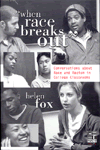Because nobody will take me seriously otherwise! Or so I sometimes say to my friends, who, being educated in the sciences in Montreal, fully appreciate the joke. Somehow, the lectures just seem so much more scientific when you can barely understand them through the professor’s thick, unapologetic accent. (Eastern- and Central-European accents seem to be the most well-regarded. Indian is also excellent, especially for math and engineering.)
The root of this prejudice is probably a mixture of personal experience (the majority of my science professors have been immigrants from the aforementioned regions), and a media-projected stereotype of the frizzy-haired, foreign-tongued, wildly eccentric scientist, who may or may not be insane, but probably is so you’d better stay away...

"Gaa! Children! Give me the answer in torr!"
I write all of this half-seriously, not quite sure if it is an example of a brilliant sense of humour or a deep-seeded self-loathing. Certainly, it betrays the sense of cultural impoverishment I’ve developed since leaving my mostly-White, mostly-Catholic, mostly-Francophone off-island suburb to attend secondary school in the gloriously diverse hoi polloi of Montreal. Everyone seemed to have a story, an identity, a unique heritage which distinguished them, but also gifted them with membership to one of the closely-knit communities that are, collectively, a great source of pride for this city, and for Canada.
In brief, I felt I had nothing to contribute. I also felt I had nowhere to belong. I was apathetically Catholic at the time, and my mother’s side of the family had, at some point, been Welsh. My father’s family, at some point, had been German. But this heritage was never mentioned at home. In fact, it was a Transylvanian calculus professor who first taught me the original Germanic pronunciation of my surname, claiming that the Anglicised version I was using was ‘wrong.’ I thanked him for the lesson but then asked, a little brusquely, how anyone could be accused of pronouncing his or her own name incorrectly. (Such a claim seemed like an error in logic unbecoming of a mathematics teacher!)
Clearly, I had no personal connection with the historical roots of my family. My brother, who has just begun his first year of college, has had much more success in cultivating such a connection, taking a German language class his first semester, and touting his pride in German engineering (he is an aviation buff), and filling his iPod with German industrial-metal. I sometimes tease him that he is retroactively selecting a particular part of our genetic inheritance and exploiting it for the purpose of being ‘cool,’ but the truth is, I am a little envious.
And so when reading Beverly Tatum’s book, ‘Why Are All the Black Kids Sitting Together in the Cafeteria?,' I was immediately struck by the nearly opposite experiences the author and I have had with race. She, feeling apartness because of her association with a cultural minority, and I, feeling apartness because of my lack of association with one. Tatum quotes Audre Lorde on page 22:
Somewhere, on the edge of consciousness, there is what I call a mythical norm, which each one of us within our hearts knows “that is not me.” In america, this norm is usually defined as white, thin, male, young, heterosexual, christian, and financially secure. It is with this mythical norm that the trappings of power reside within society. Those of us who stand outside that power often identify one way in which we are different, and we assume that to be the primary cause of all oppression, forgetting other distortions around difference, some of which we ourselves may be practicing.
After reading this, I knew that my perception of the mythical norm was very different from the one described here. Except for my being a woman, I fit the mold perfectly, and yet I have never felt that I was ‘the norm.’ From my point of view, the norm is, ironically, diversity itself. And so I presented this question to our class: What is the mythical norm in Canada? Is there one at all?
My classmates’ answers made me realize that I was being too self-centric in my analysis. That is, the level of diversity in Montreal is not representative of other parts of Canada, where the mythical norm illustrated by Lorde might be very appropriate. Samantha raised the excellent point that in Quebec, the norm might not be as defined by ethnicity as much as it is by language. That is, the political power lies largely with the Francophone community, and this is often very present in the minds of Anglophones and Allophones. Being Anglophone myself, I was surprised that I hadn’t thought of this right away.
Perhaps my history of being educated in English-speaking private schools, and my tendency to immerse myself in the school community completely, has made me less aware of what is going on off campus. Perhaps, too, my envy of my peers’ cultural distinctiveness has blinded me to the possibility that this distinctiveness might be the target of bigotry. I have always considered myself a culturally aware person simply by virtue of having lived in Montreal, but perhaps this is naïve on my part. The cultural dynamics as they exist in a school (especially a private school) are probably not representative of the larger society in which that school is located.












1 comment:
Your idea of cultural identity is unique to me. Or maybe it just seems different because I live in a city so different from Montreal. Here in Pittsburgh, it's almost as if you are either black or white. I happen to fit into the "norm": young, white, male. If someone to ask me my nationality though, I would reply "American", not British and Irish. Why is this and why wouldn't Canadians simply say "Canadian"?
I am also a high school student and am co-head of the school's culture club - and was forced into it (by the guidance councilor, OF COURSE). Raja, the other student in charge is an Indian-American male. We interact regularly, not only in meetings about the club but in Precalc as well. I treat him as my peer as he deserves.
I have to be completely honest - I know many of the kids who come to events scheduled by the culture club only do to get out of class. Even while there, one can see distinct racial and social groups separated from one another: the whites, the blacks, the cheerleaders, the band geeks. Educators cannot force these groups to mix. Short term encouragement may be beneficial, but too much can cause negative results.
The club is [supposedly] completely voluntary. However, it's well-known this councilor likes to push people into doing things. Perhaps she enjoys the feeling of controlling teens my age. (I feel like the woman's lab rat, destined to spend the next year of my life navigating a maze she has personally constructed, just for me.)
If you are to become a science teacher, would focusing on culture in the classroom really be a good idea, i wonder? Is that really in your job description? I know I would be frustrated if the AP Biology teacher decided to take any amount of time out of the lesson to discuss race or culture not directly connected to the subject material we were learning for the test we are all doomed to take in the spring.
I wrote this quickly. I hope it makes at least a little sense. Off to more work, now.
Post a Comment